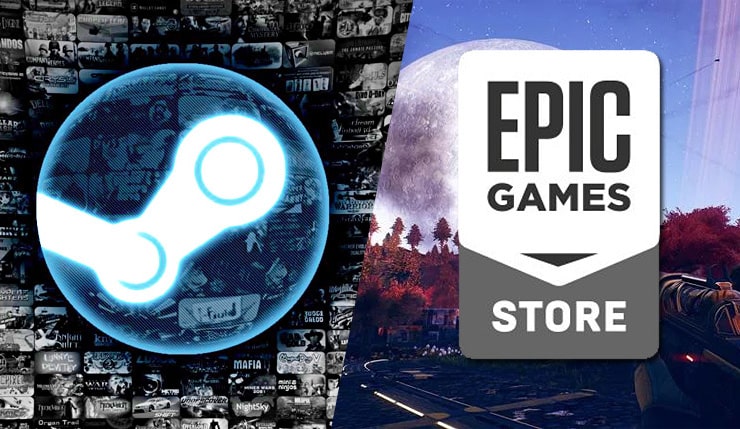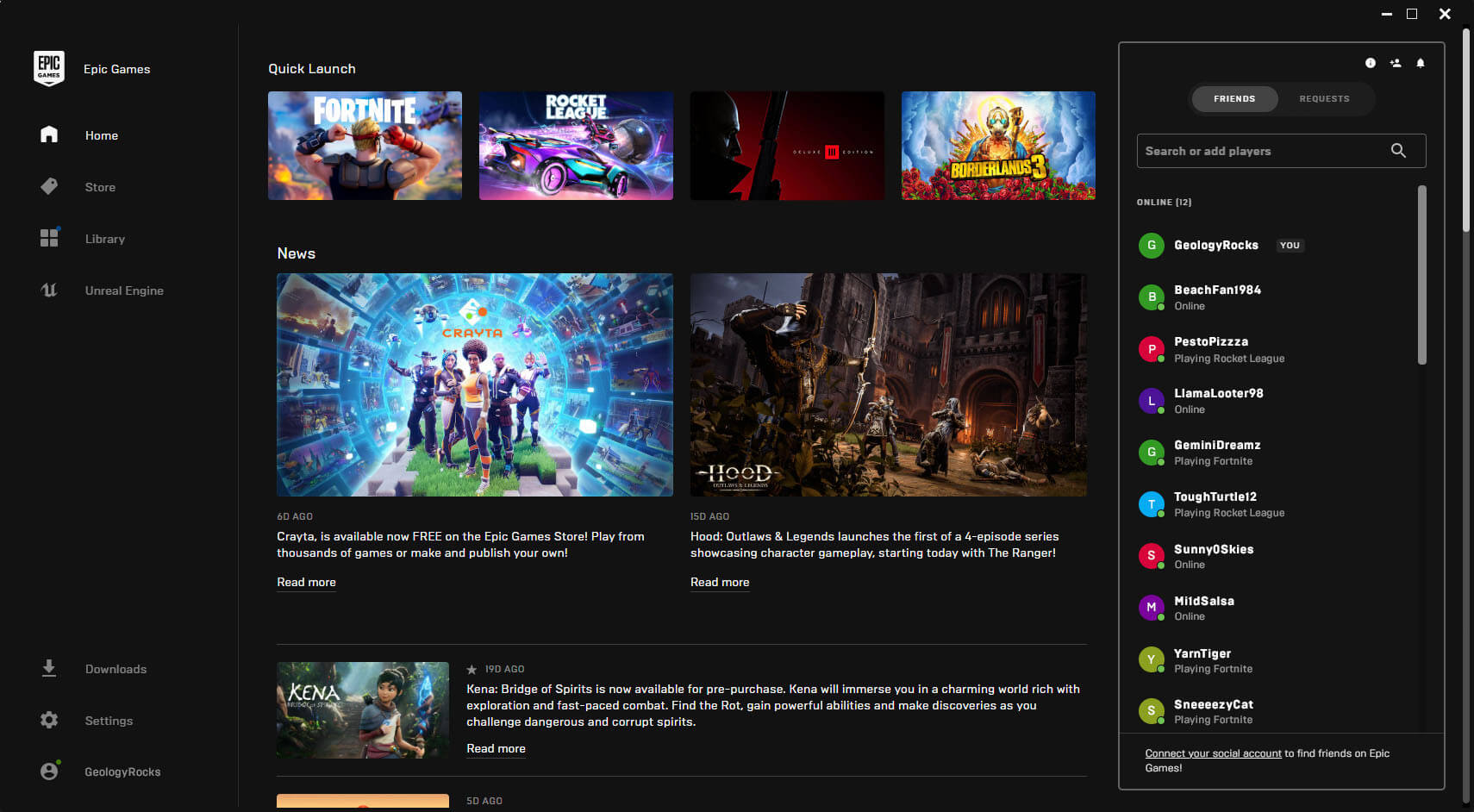In the contemporary global of gaming, where digital nation-states are as dynamic as the players inhabiting them, gaming launchers have emerged as important gateways to the virtual gaming universe. Among the standout contenders on this area are Steam and Epic Games, every offering a distinct array of offerings that cater to diverse gaming appetites. The selection among those giants entails a nuanced evaluation in their functions, blessings, and disadvantages.
The Digital Gaming Evolution
Gone are the days whilst physical copies of video games dominated the scene. Digital gaming has evolved right into a robust ecosystem, offering extraordinary comfort, accessibility, and a myriad of gaming possibilities. This evolution has been accompanied by way of the upward push of gaming launchers, which function portals to an expansive universe of virtual titles. Among those, Steam and the Epic Games Store have carved out prominent spaces, presenting gamers with get entry to to an intensive selection of games, starting from indie gem stones to blockbuster hits.
Steam: The Old Guard
Steam, an indutstry veteran set up by Valve Corporation in 2003, stands as a pioneering pressure in digital gaming. With years of evolution under its belt, Steam has cultivated an unequalled recreation library that spans more than one genres and generations. The platform’s strengths lie not best in its comprehensive sport series however additionally in its multifaceted functions.
From community engagement equipment like boards and consumer reviews to the innovative Steam Workshop for person-generated content and mods, Steam has fostered a feel of camaraderie and creativity among players. The platform’s library control gear make certain that organizing and getting access to games is a seamless enjoy, whilst its forays into digital fact (VR) gaming have solidified its function at the forefront of technological innovation.
Epic Games Store: The Disruptive Challenger
In more recent times, the gaming landscape witnessed the emergence of the Epic Games Store, the brainchild of Epic Games, the creators of the globally acclaimed Fortnite. The Epic Games Store has entered the scene with a disruptive technique, difficult installed norms and enticing gamers with specific services. One of its standout capabilities is the practice of supplying exquisite video games without cost, a method that no longer simplest endears players but also introduces them to titles they won’t have taken into consideration in any other case.
Furthermore, Epic’s dedication to developer-friendly revenue splits and its assist for content material creators thru the Creator Program have garnered attention and appreciation. The Epic Games Store also prioritizes cross-platform integration, acknowledging the multi-device gaming landscape of modern players.
Diverse Paths, Different Priorities
As players stand on the crossroads of those two distinct gaming launchers, their choice-making system hinges on personal choices and priorities. Steam, with its rich history, expansive library, and well-established community features, appeals to folks that price a dynamic social gaming experience, content material creation, and a widespread game catalog. On the opposite hand, the Epic Games Store’s disruptive method, with its awareness on free games, developer aid, and pass-platform play, resonates with players seeking innovation and new horizons inside the gaming sphere.
The Road Ahead
In this exploration of Steam and the Epic Games Store, we delve into the pros and cons of each platform, dissecting their unique attributes and identifying potential areas for improvement. By understanding their individual strengths and weaknesses, players can embark on an informed journey toward selecting the gaming launcher that aligns with their gaming philosophy, preferences, and aspirations. As the digital gaming landscape continues to evolve, the choice between Steam and the Epic Games Store becomes a reflection of the player’s ever-evolving adventure in the realm of pixels and possibilities.
Steam: The Veteran Gaming Launcher
Pros:
- Community Integration: Steam’s community features, along with forums, consumer opinions, and sport publications, offer a platform for gamers to attach, share reports, and provide help to fellow gamers.
- Library Organization: Steam’s library management tools, such as categories, tags, and collections, allow players to organize their game collection and easily find the titles they want to play. This degree of enterprise turns into more and more important as the sport library grows over the years.
- Steam Link and Remote Play: Steam offers the ability to stream games from your main PC to other devices using Steam Link. Additionally, the Remote Play feature function allows you to play nearby multiplayer games on-line with pals, although the sport itself does not natively aid on-line multiplayer. This feature can revive sofa gaming experience in a virtual world.
- VR Support: Steam has robust virtual reality (VR) support, offering a wide range of VR games and compatibility with various VR headsets. This makes it a move-to platform for VR enthusiasts, permitting them to discover immersive digital worlds seamlessly.
- Regional Pricing: Steam often implements regional pricing, making games more affordable for players in different parts of the world. This strategy not only promotes accessibility but also acknowledges global economic differences, making gaming more inclusive.
- Early Access Program: Steam’s Early Access program lets players support and play games that are still in development. While this concept carries some risk, it allows gamers to influence the direction of a game’s development and experience new content ahead of its full release.
Cons:
- Interface Bloat: Steam’s interface can sometimes be overwhelming due to its abundance of features. New users might find it challenging to navigate initially, and even experienced users might feel that certain features could be more streamlined.
- Customer Support: While Steam has made strides in improving its customer support, occasional issues still arise. Some users report difficulty in getting timely assistance, especially during high traffic times like sales events.
- Digital Rights Management (DRM): Steam’s reliance on DRM to prevent piracy has sparked debates among gamers. While DRM helps protect developers’ interests, some users argue that it can limit their ability to use games they’ve legitimately purchased.
Epic Games: The Challenger Gaming Launcher
Pros:
- High-Quality Free Games: Epic’s free game offerings aren’t limited to indie titles; they often include high-profile games, introducing players to titles they might not have considered otherwise.
- Security Measures: Epic’s strong security measures, such as two-factor authentication, provide users with peace of mind, ensuring their accounts remain protected.
- Epic Creator Support: The Creator Program encourages content creators to promote games and the platform, potentially earning them a share of the revenue generated through their efforts.
- Timely Updates: Epic Games Store’s iterative approach means that user feedback can lead to rapid changes, enhancing the overall user experience.
- Cross-Platform Integration: Epic’s dedication to cross-platform play contributes to breaking down barriers between different gaming ecosystems and promoting inclusivity.
- In-House Exclusives: While exclusivity can be divisive, Epic’s approach to funding and supporting games like “Fortnite” and “Hades” has led to unique and successful titles that might not have existed otherwise.
Cons:
- Feature Gap: Although the Epic Games Store has been improving its features, certain functionalities commonly found in other launchers, like an extensive achievements system, are still in development.
- Privacy Concerns: Data collection practices that serve advertising purposes have led to concerns about user privacy. Striking the right balance between personalized experiences and data protection remains a challenge.
- Limited Payment Methods: Compared to Steam’s extensive array of payment options, the Epic Games Store has been criticized for offering a more limited set of methods for purchasing games.
- Offline Mode Limitations: While Epic Games Store does offer an offline mode, its functionality is more limited compared to Steam’s offline mode, which might inconvenience users who frequently find themselves without an internet connection.
Conclusion: Making an Informed Choice
In the ever-evolving realm of digital gaming, the decision between Steam and the Epic Games Store hinges on understanding their unique offerings, strengths, and drawbacks. Both platforms cater to diverse gaming preferences and prioritize different aspects of the gaming experience. Here, we distill the key points to help you make an informed choice.
Steam: The Veteran Gaming Launcher
Steam’s legacy as a pioneer in the gaming launcher arena is evident in its expansive game library, unparalleled community integration, and feature-rich interface. Its thriving community features, such as forums, user reviews, and the Steam Workshop, foster a sense of camaraderie among players. The library organization tools and VR support elevate the gaming experience, while features like Steam Link and Remote Play revolutionize how and where you play. Regional pricing not only promotes accessibility but also acknowledges the economic diversity of players worldwide. However, Steam’s interface can be daunting due to its myriad features, and certain customer support issues persist.
Epic Games: The Challenger Gaming Launcher
Epic Games Store offers an enticing alternative with its high-quality free games, strong security measures, and creator support program. The platform’s dedication to timely updates and cross-platform integration aligns with modern gaming trends, while the pursuit of in-house exclusives has birthed unique gaming experiences. Privacy concerns and the ongoing development of certain features are areas that Epic continues to address. While it initially lacked in comparison to Steam’s extensive offerings, the Epic Games Store has shown a commitment to evolving and filling the feature gap.
The Choice: Personal Preferences
Ultimately, your decision should be guided by your gaming priorities. Steam’s well-established infrastructure, community engagement, and library organization make it an excellent choice for those who relish a vibrant social gaming experience, mod support, and a comprehensive game catalog. If you’re enticed by exclusive titles, developer-friendly revenue splits, and innovative approaches to free game offerings, the Epic Games Store might resonate with you.
Consider your desire for community interaction, game selection, security measures, available features, and personal preferences. The gaming landscape is ever-changing, and both platforms continue to evolve in response to user needs. Keep an eye on updates and improvements that could sway your decision. As gaming technology and trends advance, your choice between Steam and the Epic Games Store should be a reflection of your unique gaming journey and aspirations.



